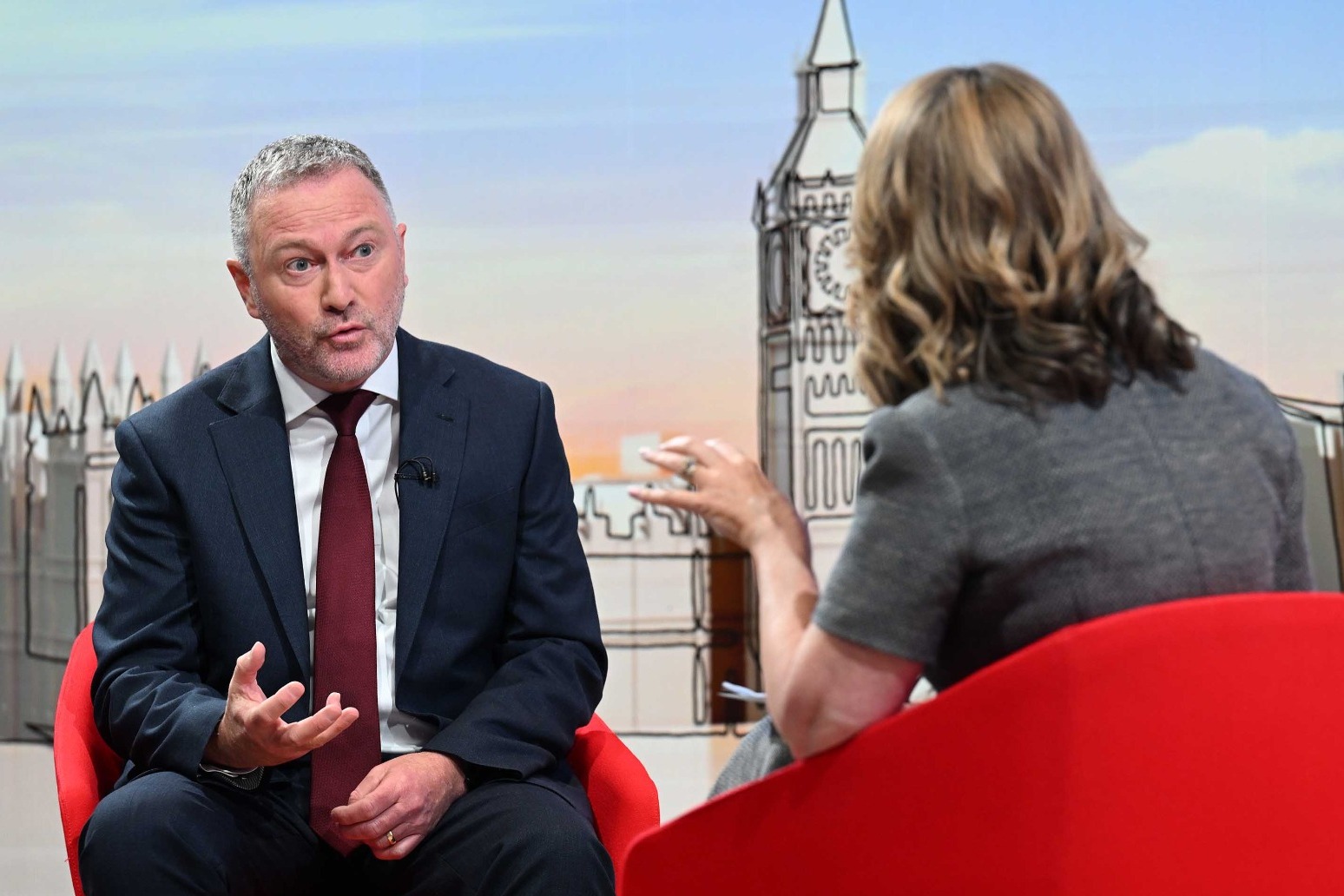
Minister claims Tories hid issues as Reeves set to unveil black hole in finances
A Cabinet minister has said the Tories left a “catastrophic” inheritance and covered up the extent of the issues, as Chancellor Rachel Reeves is expected to unveil a black hole in the public finances of around £20 billion.
Environment Secretary Steve Reed was asked if Labour’s shock about discovering the state of public finances after coming to power was “theatre”.
Mr Reed told Sunday Morning with Trevor Phillips: “It’s not only that we didn’t know, the prime minister deliberately covered it up.”
He pointed to the state of prisons and the Rwanda policy as examples of public finance issues the Labour Government is learning the true extent of after taking office.
He would not confirm that Labour would consider pensions relief and capital gains and inheritance levies to plug the gap.
“I don’t see the benefit in speculating when we don’t even know the full scale of the problem yet,” he said, adding: “We’re not going to shy away from difficult decisions.”
The Chancellor will outline the spending inheritance left by the Conservatives when she presents the results of a Treasury audit to Parliament on Monday.
A Government spokesman said the audit had shown “the previous government made significant funding commitments for this financial year without knowing where the money would come from”.
The spokesman said: “The assessment will show that Britain is broke and broken – revealing the mess that populist politics has made of the economy and public services.”
Shadow paymaster general John Glen rejected claims that the Tories had left a £20 billion black hole, as well as Labour’s charge of “deception”.
He told Times Radio there has been “full transparency” around public finances.
Wes Streeting said this week that he has ordered a review into the funding and timetable for the Conservatives’ £20 billion New Hospital Programme to deliver 40 new hospitals by 2030.
The Health Secretary said it is “painfully clear” it will not be possible to deliver those hospitals in the timeframe.
The Chancellor is reportedly set to scrap or cut back infrastructure projects.
These could include the £500 million Restoring Your Railway Fund and the A27 Arundel bypass, The Sunday Times reported.
The paper also said the Chancellor will confirm the Government will not commit itself to a new £1.7 billion tunnel under the Stonehenge monument on the A303.
The project is currently tied up in legal action with the Court of Appeal yet to rule on a bid by campaigners to stop it going ahead.
Ms Reeves is also expected to approve above-inflation pay rises for millions of public-sector workers in response to the recommendations of independent pay review bodies.
Teachers and some 1.3 million NHS staff could be in line for a 5.5% pay boost, which could cost about £3.5 billion more than had been budgeted for.
This could rise to about £10 billion if other pay review bodies give similar advice on workforces such as police and prisons officers and doctors and dentists, according to the Institute for Fiscal Studies (IFS).
As this cost has not been fully budgeted for in current plans, the cash would have to be raised through existing fiscal headroom, tweaking fiscal rules or tax increases.
Any tax increases to meet those costs would not be expected before the autumn Budget, the date of which Ms Reeves is also set to announce on Monday.
Labour has ruled out lifting income tax, VAT, national insurance and corporation tax, potentially leaving changes to pensions relief and capital gains and inheritance levies on the table.
The director of the influential Institute for Fiscal Studies said he believes it “pretty likely” that Labour will raise taxes in some form and said reversing national insurance cuts would resolve a £20 billion black hole.
Paul Johnson told Times Radio that “at the top level, the fact that public services were in a mess, there wasn’t much money knocking around and this was going to be a struggle, that’s not a surprise.”
When it comes to reports there are a series of rebuilding projects and hospital building projects where the money hasn’t been allocated, that “may have been a bit less obvious from opposition,” he said.
But he said it should not have come as a surprise that pay review bodies recommended increases of more than 1% or 2% or that there was going to be a big bill for asylum seekers.
Home Secretary Yvette Cooper told the Commons last week that the now-scrapped Rwanda deportation scheme cost Britain £700 million despite only four volunteers being sent to Kigali, and accused the previous government of creating an “asylum Hotel California”, where people arrived in the system but never left.
Angela Rayner is also due to unveil an overhaul of planning rules next week as Labour seeks to clear a path to building 1.5 million homes in five years.
The Deputy Prime Minister and Housing Secretary wrote in The Observer that “delivering social and affordable houses at scale” is her “number one priority”.
The overhaul, to be announced before MPs leave for summer recess, will include bringing back mandatory housing targets that were scrapped by the previous Government and introducing “golden rules” to ensure development works for local people and protects nature, Ms Rayner said.
“We plan to set out in detail more of these early and important changes in an updated national planning policy framework next week,” Ms Rayner wrote.
She also said Labour knew there was a housing emergency when they came into power, but that “lurking under each stone we lift” is “a frankly scandalous legacy” left by their Conservative predecessors.
Published: by Radio NewsHub